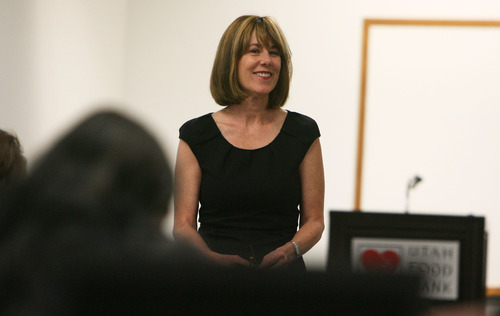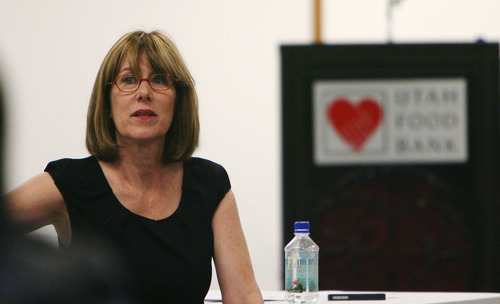This is an archived article that was published on sltrib.com in 2012, and information in the article may be outdated. It is provided only for personal research purposes and may not be reprinted.
Utah Clean Energy. Head Start. The Road Home. These are hardly fly-by-night nonprofits, but rather mainstays of Utah's well-populated, philanthropic landscape.
But a mean recession hurt charities large and small — the Community Foundation of Utah reports the state has lost 38 percent of its registered nonprofits since 2009, down to 3,568 from 5,754. That's why these leaders have come on a recent Thursday to the foundation's "social entrepreneur" workshop.
"The age of relying on grants is gone," said Erin Trenbeath-Murray, director of Salt Lake City's Head Start, which runs health-conscious preschools for low-income kids. "We have to be more self-sustaining and be a better custodian of taxpayer dollars. We have to act more like a business."
Launched on a shoestring budget in donated office space, the Community Foundation of Utah exists to promote what founder Fraser Nelson calls "smart philanthropy."
The foundation is first, and foremost, a grant maker. It raises money, pooling donations and grants to dispense to local nonprofits on a competitive basis. Smaller funds and scholarships can be earmarked by benefactors for a particular purpose — and the money can be invested and managed by the foundation for a fee. And field-of-interest funds allow donors to pool and leverage their money for greater influence in a certain arena, such as health, education or poverty.
"People who give to charity when they die don't necessarily know what the community needs are going to be in 20 years," Nelson said. "We investigate nonprofits for them. We harness the state's entrepreneurial spirit to serve the common good."
Since opening for business in 2009, the foundation has awarded more than $1 million in grants and scholarships, matching more than 60 donors with dozens of do-gooders. It, too, survives off good will, with most of its $174,000 budget coming in the form of grants and donations.
"A lot of people thought we wouldn't succeed," Nelson said, "but we're really hitting our stride."
—
Fierce competition • Community Foundations, which build assets to improve the social fabric of cities, counties and states, date back to 1914. Today, there are more than 1,400 worldwide and 700 in the U.S. One of the first and largest, in Tulsa, Okla., has more than $4 billion in assets.
Why Utah went for so long without one is a mystery to Nelson, who started the foundation after serving for a decade as executive director of the Utah Disability Law Center. It wasn't for lack of need, she says.
Utah far outpaces other states in charitable giving, with the average household donating 10.6 percent of its annual income, but most of that goes to the LDS Church in the form of tithing.
The state also has more charities per capita than the national average, and few large benefactors, which means fierce competition for funding, Nelson said.
And it's about to get more intense. "With the economy improving, most of our big nonprofits, such as the symphony, the ballet and University of Utah, are going to be pouring out of the gate with big fund drives and pent-up demand they've been deferring for years," said Nelson.
That leaves the 80 percent of the state's nonprofits with budgets under $100,000, outgunned and undermanned, which is why so many fail.
The decline is partly due to the Internal Revenue Service's decision in 2010 to shut down organizations that hadn't filed income statements in three years, said Nelson. "But it has continued. The ones that were marginal are gone."
Sustainability remains the watchword for surviving charities and small start-ups, which means turning a profit — uncomfortable ground for nonprofits, said Steve Grizzell, managing director of the venture capital company, InnoVentures.
If done well, like Girl Scouts of America's cookie sales, the rewards are sweet, said Grizzell. "But you have to take big risks for small margins and it really creates divisions within an organization about where to reinvest the money."
—
Smart growth • Grizzell has come to the Community Foundation's social enterprise workshop to listen for investment opportunities. Business executives are here, too, doling out advice on building sensible business plans. A tax lawyer gives a primer on taxable income versus nontaxable income.
Trenbeath-Murray and other nonprofit leaders have come for ideas on how to scale up Head Start's for-profit venture, the North Star kitchen.
Created in 2009 as a means of fighting obesity and instilling good eating habits in low-income kids, the kitchen cooks and delivers 2,500 healthy meals a day to her preschools and other groups like the YMCA and Boys and Girls Club.
"For a lot of them, the meal we serve is their only meal of the day," she said. "I wanted the food to be locally bought, organic, fresh, made from scratch and served hot at a certain price point. Everyone said, 'You're nuts, you can't do that.' "
But Trenbeath-Murray persisted and hired a chef, who, with a skeleton staff in a rented building manage to prepare meals for less than $3 a piece. This year, they turned a small profit.
"The kids are eating stuff like pumpkin soup, tofu jambalaya, hummus and salmon linguine," said Trenbeath-Murray.
Through the Community Foundation, she met Greg Warnock of the investment firm, Mercato Partners, who cautioned her against expanding to become a supplier to inquiring private schools.
"He told me they let their kids choose from menu items, making it harder to do mass production, which would cost more and cause us to make mistakes," she said. "He said, 'Those kids' parents are your donors, and if they come to think of you as delivering subpar food service, that could really hurt you.'"
So Head Start is sticking to doing what it does best, feeding the brains and bodies of low-income kids. To meet growing demand from existing customers, it will need to build a bigger kitchen, a big step that Trenbeath-Murray is tentatively exploring now. —
Love Utah, Give Utah
The Community Foundation of Utah recognizes 50 do-gooders each year for their innovation, collaboration and commitment to the common good. This 'Enlightened 50' for 2012 include business and religious leaders, unsung advocates and volunteers, academics, bloggers, directors of nonprofits, and elected officials. See the list and plans for an Oct. 11 honoring them at http://bit.ly/RvaWSa.







